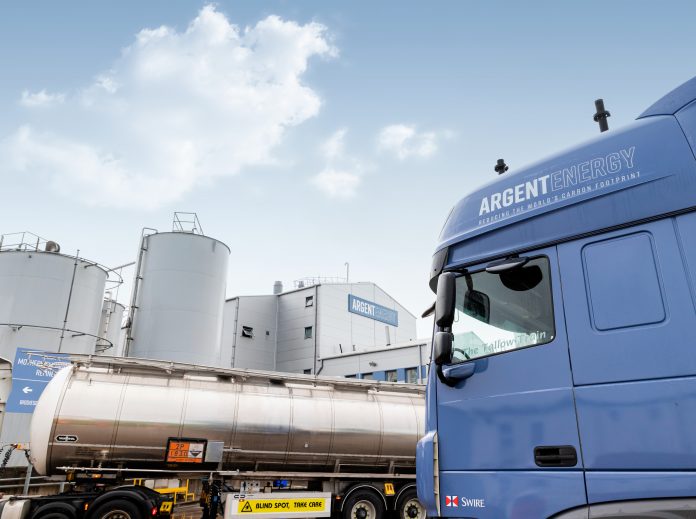Dickon Posnett, Argent Energy’s Director of Corporate Affairs and President of the European Biodiesel Board, sheds light on an existing but often overlooked opportunity to help truck fleets triple their carbon savings, immediately
Argent Energy is a renewable fuel producer that pioneered high blends in truck and bus fleets to maximise greenhouse gas savings. The trick is to do that without increasing costs to the fleet operators, but having done that, there is still a roadblock that needs to shift. Here, I shed light on an existing but often overlooked opportunity to help truck fleets triple their carbon savings, immediately.
Climate change and greenhouse gases
Climate change is scary. However, addressing it and the cost of solutions is even scarier for many. Those many will include policy-makers responsible for decarbonisation and are inevitably responsive to those that elect them. The costs can be eye-watering, but some solutions are proving to be remarkably cost-effective.
Transport is well known for being the biggest culprit of the energy sectors for emitting greenhouse gases (GHG) in terms of volume and because it continues to increase its emissions. Argent Energy began playing its part in decarbonising road transport in 2005 when the first biodiesel plant started chemically converting – and distilling – waste fats and oils into a high-grade substitute for fossil-made diesel. Our decarbonisation and our ‘de- fossilisation’ journey had begun.
Help truck fleets triple their carbon savings
Argent then grew to have a capacity of making 170 million litres of biodiesel per year and is on track to grow to over 725 million litres in the next few years. When used to replace fossil diesel, our fuel will prevent over 2 million tonnes of GHG emissions yearly. This looks like a success story, and it is.
However, three of the transport sectors are recognised as ‘difficult to decarbonise’: aviation and shipping, of course. However, the ones that don’t get so much limelight are trucks or heavy-duty vehicles (HDVs). It is this sector where there’s still much to do, as the reality of HDV electrification is that it is not expected to displace diesel engines fully for over 20 years.
Currently, almost all HDVs in the UK are running diesel engines filled with at least 93% fossil diesel. Up to 7% of the fuel may be biodiesel, the same as in all diesel vehicles in the UK. Argent and the rest of the UK’s biodiesel industry believe there is a huge opportunity here to increase that blend level and thereby make a serious increase in the GHG savings in the sector.
In fact, we aim to replace as much of the diesel used in diesel trucks (and buses and coaches) with waste-based biodiesel. This must not deter or slow down efforts to electrify or find other zero-emission options – it must work alongside. This way, we can not only plan and strategise for results in the future but also make more GHG savings right now.
Paying for carbon-saving efforts
No one should pay more than necessary for our carbon-saving efforts. The HDV sector is highly sensitive to fuel pricing, and any changes usually find their way to the end consumer anyway. Therefore, we should seek to find the most cost-effective solutions, maximise those first, and work on what else can be done.
The cost of high biodiesel blends (greater than 7% biodiesel and typically around 20% to 30% – known as ‘B20’ and ‘B30’) to an operator of HDVs is around the same as the cost of standard diesel. It is more expensive to make, but owing to the UK’s mandate for renewable fuels, the Renewable Transport Fuel Obligation (RTFO), the fuel use means users can benefit from the value of certificates (RTFCs) earned by the suppliers.
Supplying biodiesel in the UK
Several fuel suppliers around the UK, including Argent Energy, can supply the high blends, and many of us are already part of a scheme that assures customers that the fuel they are buying is indeed sustainable and meets the government’s criteria as a renewable fuel. The Renewable Fuel Assurance Scheme (RFAS) was set up as a way to encourage fleet operators to trust the GHG savings claims from fuel suppliers so they can, in turn, demonstrate to their companies – and their customers – the extra emission savings the fuel delivers. The level of savings the fuel brings varies slightly between fuels. Still, if biodiesel is made in the UK, it will almost certainly be made from waste and, therefore, have the best possible GHG-saving credentials.
The fuel standard in the EU and UK for high blends of B20 – B30 has been in place for some years and is one reason these blend levels are the sensible option. Another reason is that there are very few changes an operator must make when switching from standard diesel, and another reason is that, at this level, sufficient biodiesel is available to supply the UK’s whole HDV fleet.
Given all these positives and the cost-effectiveness of this fuel, people will be right to question why high blends are not taken up in any significant volume. The answer lies mainly in the world of warranties. Most fleets have different models and different ages of vehicles. Some of these may have engines not tested by the manufacturer on high blends and are not warrantied for use.
These vehicles are so critical, even if they are in the minority because most fleet depots will only have one or maybe two fuel tanks for the whole fleet. So, the entire fleet suffers if even one vehicle is effectively barred from high blends. Manufacturers are unwilling to commit resources to warrantying legacy engines and are under little pressure to do so while they see government support rolling in for future electric options.
De-fossilisation of the HDV diesel fleet
In summary, we have a situation whereby the most cost-effective means for de-fossilisation of the HDV diesel fleet is being stymied by a lack of warranty testing and very little noise calling for action. But it is too big and valuable an opportunity for the UK to miss, so seeing small but encouraging signs of life for the high blend and its good value decarbonisation is something we should all welcome.
Various organisations, including the Renewable Transport Fuel Association, the Zemo Partnership, the Department of Transport and even the Treasury, are starting to have serious conversations about how high blends like B20 could provide trucking organisations with a real and cost-sensible alternative to fossil diesel now. Fuel suppliers could start delivering this fuel to fleet operators tomorrow. All we need is the right incentives for HDV operators, especially those that refuel their vehicles back at base, and they could be switching en-masse to high blends and tripling their GHG savings.

This work is licensed under Creative Commons Attribution-NonCommercial-NoDerivatives 4.0 International.











